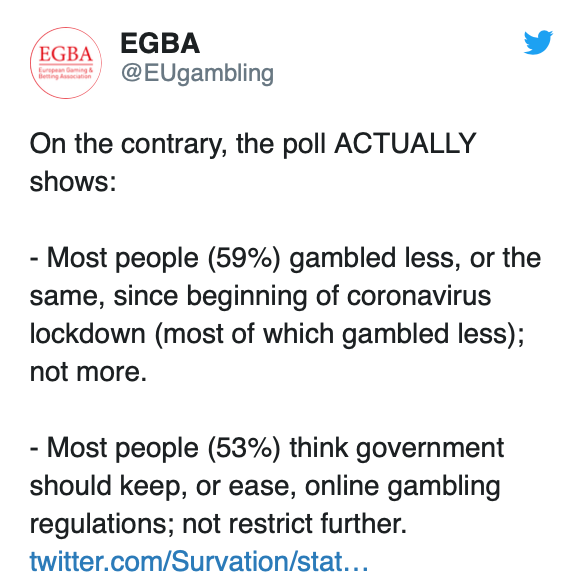
Lies, damned lies and EGBA statistics

Clean Up Gambling
30/04/2020
Against the odds, Clean Up Gambling's Survation polling on the impact of the lockdown on regular gamblers landed in the industry publication CDC Gaming.
The article cited Brussels-based trade body the European Gaming and Betting Association (EGBA) - which represents gambling firms such as William Gill, GVC and Bet365 - attempting to spin the findings on Twitter.

The reality is:
- 62 per cent of gamblers who have changed their gambling are betting more rather than less and
- 64 per cent of gamblers are gambling the same or more since the lockdown, despite the cancellation of sports fixtures
Regular gamblers were also asked their views on gambling regulation. While 30 per cent accepted the status quo, 40 per cent thought gambling regulations should be tighter, and 23 per cent thought it should be easier to gamble.
The EGBA claimed with some excitement that 53 per cent did not want tighter restrictions, but their excitement is misplaced given:
- 63 per cent of gamblers have no desire for any ease of restrictions and
- 63 per cent of the gamblers who want a change from the status quo are in favour of tighter restrictions
Gambling Commission data for the period April 2018 to March 2019 shows that turnover for all online gambling activity was £119 billion, of which slots contributed £55 billion.
Slots, the most addictive online activity, with the most inducements, advertising and promotion, makes up almost half of all online gambling turnover.
Those who care about the long-term future of online gambling should be looking beyond quarterly results or trying to maximise short-term shareholder value.
Instead they need to recognise that the current business model, which derives the vast majority of revenue from those experiencing gambling-related harm, is unsustainable - both commercially and politically.
Copyright © 2020 Clean Up Gambling.